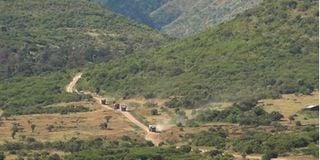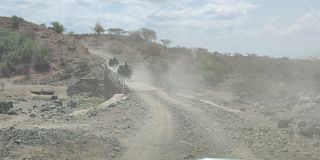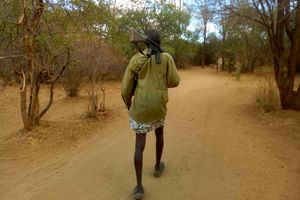
Security officers in Samburu County are pursuing bandits who shot dead a police officer before aiding the escape of eight remandees en route to Baragoi.
On the desolate stretch of road near Morijo along the treacherous Maralal-Baragoi route, Agatha Kairo survived a harrowing bandit attack last week. She considers herself lucky to have escaped alive.
She was travelling to Baragoi when gunmen ambushed her.
"They just came from nearby bushes and descended on us. It was a terrifying experience, but I'm lucky to be alive," said Agatha, who is recovering from gunshot wounds at the Samburu County Hospital.
In the same week, a father and son on a motorcycle survived an attack by bandits near Poro when gunmen opened fire on them.
These attacks highlight growing concerns that armed bandits are stepping up their attacks on residents and motorists on the Maralal-Baragoi road, which is rugged and rocky, with many parts lacking mobile phone coverage, giving the bandits an advantage.
The main road linking villages in Samburu North has been plagued by banditry, with numerous attacks in the past year alone.

A view of Maralal town in Samburu County.
Once a vibrant area, parts of the road now feel menacing, with potential ambushes for anyone travelling along it. The road has thick bushes, making it a prime spot for armed criminals to scout and ambush unsuspecting motorists travelling along the route.
The road also traverses hills and valleys which have also given the criminals an advantage.
The rugged terrain, coupled with the sweltering heat, has been a boon to the bandits, with the troubled region witnessing a surge in deadly attacks that have claimed more than three lives in recent incidents.
In a bid to curb the rampant attacks and flush out the bandits, Samburu County has launched a roadside bush-clearing exercise to improve security along the route.
Governor Lati Lelelit said the exercise would enable security forces to secure the troubled region.
“We have allocated funds to clear bushy areas along the road. It's one of the projects aimed at reducing highway banditry in our community,” he said.
“The Baragoi-Maralal road is crucial. That's why we have allocated resources to make it safe. We'll clear at least 500 metres on either side.”
The bush areas along the road, which are believed to be bandits' hideouts and will be given top priority in this initiative, include Morijo, Lorian, Marti and Mbukoi.
When gunmen carry out attacks, they retreat to these areas, making it impossible for security forces to track them.

A long view of Kapedo bridge where many people, including security officers have been ambushed and killed by bandits lying in wait on the cliffs above.
There are reports that bandits are turning the Malaso valleys into their 'operational area', staging attacks across Samburu West.
The terrain in these valleys, characterised by sharp rocks, mountains, thorny bushes and cacti, is difficult to access, making it a challenge for security forces.
The ongoing security operation in parts of the North Rift region has reportedly forced bandits out of their hideouts and into Malaso, Samburu County.
Governor Lelelit expressed optimism that the exercise would restore confidence among road users.
Persistent bandit attacks recently prompted the Samburu Council of Elders to resort to ancient curses as a last resort to end the ongoing crime wave.
The age-old tradition, considered the most dreaded punishment for criminals, is now being used to combat cattle rustling and highway banditry, which continues despite the heavy presence of police backed by the military.
Locals and leaders are also watching closely to see how newly appointed County Commissioner Onesmus Kyatha tackles perennial insecurity challenges such as cattle rustling and escalating banditry.
Kyatha takes up the post in the volatile Samburu region, replacing Henry Wafula who has been transferred to Makueni County in the same capacity.
"He should prioritise security. We are no longer safe, and we feel that we are left to die," said Mary Naibulu, a resident.
Despite various efforts to restore peace, animosity between the warring communities persists.
From ancient weapons such as spears and arrows, the conflict has evolved with the proliferation of illegal firearms, resulting in daily gun battles.
Josephat Lekume believes that the only lasting solution to cattle rustling is to end the illegal possession of firearms. He also highlights the challenge of poor road networks, which prevent police patrol vehicles from reaching some areas.
Bandit attacks led to the closure of the Soit-Pus Primary School and the displacement of more than 100 families.











